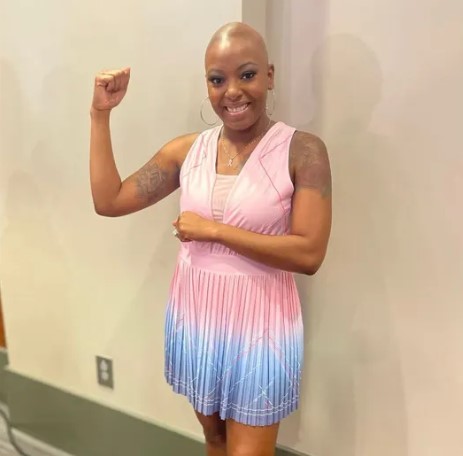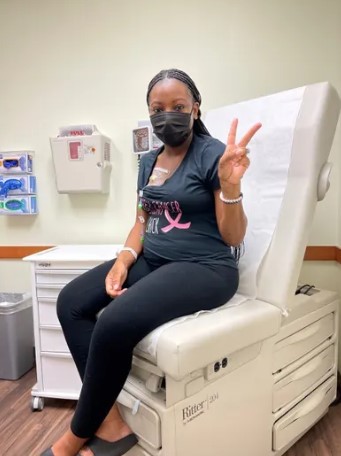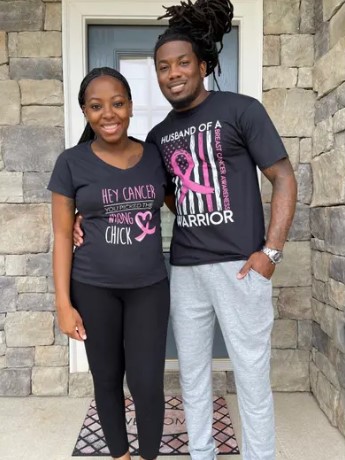
Experiencing changes in your breasts during pregnancy is to be expected, so when April Addison felt a small, hard knot in her breast near her nipple, she chalked it up to a clogged milk duct since her breast milk was coming in. Unfourtanetly, it turned out to be something much worse.
Toward the end of her pregnancy, the lump suddenly started to hurt, then the pain disappeared. Concerned, Addison told her obstetrician during her 39-week check-up. She was referred to another doctor for a breast ultrasound to take a closer look at the lump.
“She said, you know, we see some lymph nodes that look abnormal, so we need to do a biopsy,” Addison recalls. “So, 39 weeks pregnant, I get a biopsy done.”
“I started crying, Addison adds. “Being an oncology nurse, I’m like, ‘Oh goodness, I have no family history of breast cancer. So what could possibly be going on?'”
The confusion is something that her oncologist says is understandable.
RELATED: 5 Commonly Overlooked Signs of Breast Cancer

“With breast cancers, it can be really hard during pregnancy, because there are so many changes that are happening in your breast that you just have a hard time knowing, is this normal or not normal,” her oncologist, Dr. Amelia Zelnak, the president of Atlanta Cancer Care, says.
Addison gave birth to her son, Ashton, on June 27, 2022, by cesarean section. The next day, the 32-year-old was officially diagnosed with stage 2 breast cancer.
“I was, you know, hurt,” Addison says. “I was confused. I felt like, man, I had been given a bad hand. I’m like, ‘Why is this happening to me, you know, right now?'”
While she was in the hospital, she had her first mammogram and breast MRI, where she and her doctor discussed her treatment options.
Within a couple of weeks, she was informed that she would need to start treatment, which would likely include surgery, chemotherapy and radiation.

“She chose to get the chemotherapy first, which we do oftentimes in younger women where we know that chemotherapy absolutely needs to be done,” Dr. Zelnak says. Getting chemotherapy also gave the new mother time to think about the next step in her treatment journey.
‘So, instead of rushing into, ‘I just had this baby, and now I have to make a major decision in the next week or two about what type of surgery I want to have,’ she had 4 months to consider her options about how to best proceed,” Dr. Zelnak says.
In the end, Addison chose a bilateral mastectomy, which is the surgical removal of both breasts. A bilateral mastectomy radically lowers the risk of a recurrence.
Once she is completely healed from the operation, Addison’s next step will be radiation therapy.
In the meantime, Addison is balancing taking care of her sons, 6-month-old Ashton and 3-year-old Aiden, as well as being a wife to her husband Leo, while she recovers from a mastectomy and breast reconstruction surgery.

RELATED: What Does a Breast Cancer Lump Feel Like?
Although she has a strong support system (including support from family, friends, coworkers and her treatment team), Addison admits that going from a cancer nurse to a cancer patient hasn’t been easy.
“I’m so used to caring for everybody and, you know, doing things for everybody,” Addison says. “So it’s hard when you have to let go, and now you’re the patient, and now it’s time for people to care for you.”
Despite this, she is looking at the bright side: her son is healthy. “He is full of laughter, always laughing, you know,” she says. “He’s a great baby.”

In sharing her story, Addison hopes that it will encourage other women to pay attention to any changes in their bodies.
“Never think that you’re too young,” Addison says. “Never think that, because you don’t have a family history of it, that it can’t happen to you. Because I’m a perfect example of how it can. If you feel something, you know, speak up. You need to say something. If you see something, if you see changes or, you know, not right in your body, you need to speak up and say something.”
If you are pregnant and have breast cancer, you might have hard choices to make, so get expert help and be sure you know all your options. According to the American Cancer Society, you can safely get treatment for breast cancer, although the types of treatment used and the timing of treatment may be affected by your pregnancy. If you are pregnant and have been diagnosed with breast cancer, your treatment recommendations will depend on:
- The size of the tumor
- Where the tumor is located
- If the cancer has spread, and if so, how far
- How far along you are in the pregnancy
- Your overall health
- Your personal preferences








